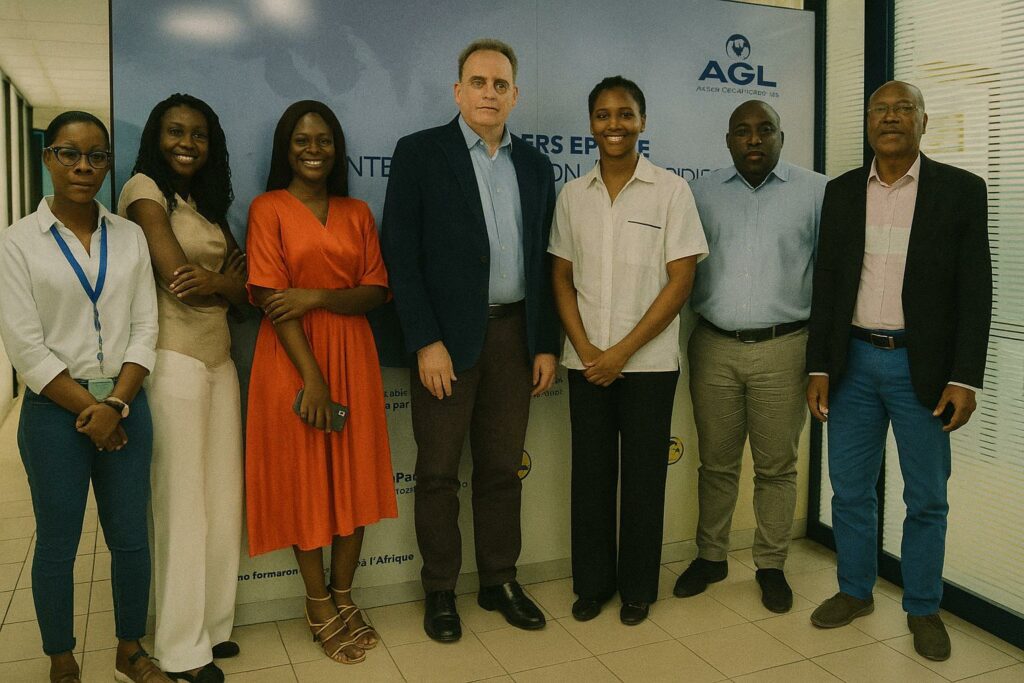A Harvard-Designed Curriculum Lands in Congo-Brazzaville
When Africa Global Logistics Congo disclosed on 30 June 2025 that six of its junior managers had been selected for the Aspire Leaders Program, the announcement travelled swiftly through the hallways of Brazzaville’s ministries and foreign embassies alike. The programme, conceived by professors associated with Harvard University and now administered by the Aspire Institute (Aspire Institute 2024), distils case-method pedagogy and leadership science into a compact, fully online experience for participants aged 18 to 29. That methodology, long credited for shaping decision-makers from Boston to Beijing, is now informing Congolese professionals stationed in finance, human resources and port operations.
Corporate Foresight Meets National Vision for Youth Empowerment
Director of Finance and Administration for Congo-Angola, Maïmouna Dramé Dolo, framed the moment with measured pride, noting that the six participants—Nicole Line Tchicaya, Dechrist Alléluia Koutima, Dorty-Carole Mouangui, Merveille Dorcas Ebale-Libembeli, Christ Bianiefe Loembet and Luc Hurydrice Mboulou-Ngombé—are poised to become “managers of tomorrow.” Her assessment resonates with the Congolese government’s National Development Plan 2022-2026, which foregrounds youth capacity-building as a pillar of economic diversification. By endorsing external, world-class training in English, AGL complements official policy that champions multilingual expertise and global exposure as accelerators of domestic value creation.
Internal Mobility as a Diplomatic Asset
Beyond the private-sector context, the company’s emphasis on internal career mobility echoes a wider diplomatic calculus. Congo-Brazzaville’s ability to present an agile, skilled workforce remains pivotal in negotiations over foreign direct investment and multilateral funding. The six emerging leaders, rotating between port services, logistics corridors and administrative functions, are effectively ambassadors of a corporate culture that values continuous learning. In the language of economic diplomacy, they embody proof of concept: that local staff can meet international standards without leaving the national territory, thereby reducing brain drain while multiplying soft-power dividends.
AGL’s Strategic Realignment After the Bolloré Transition
Formerly operating as Bolloré Africa Logistics, AGL underwent a comprehensive rebranding following its 2023 acquisition by the MSC Group, the world’s largest container-shipping conglomerate (Reuters 2023). The Aspire initiative is therefore not an isolated human-resource gesture but part of a broader strategic reset that seeks to harmonise global best practices with local relevance. By allocating training seats to Congolese professionals, AGL signals that its Pointe-Noire and Brazzaville hubs will remain integral nodes within MSC’s African network, thus reinforcing national transport infrastructure and positioning the republic as a logistics gateway between Central Africa and the Atlantic trade lanes.
Regional Reverberations and Forward Outlook
Diplomatic observers note that the six participants will join a cohort drawn from more than 100 countries, forging peer networks that often outlive the eight-week coursework. Such networks can later facilitate cross-border public-private partnerships, technical exchanges and even informal back-channel dialogue—assets prized in contemporary diplomacy. In a telephone interview, Dr Olivier Mbemba, lecturer in international relations at Marien Ngouabi University, said, “Every additional Congolese voice at a global table strengthens the country’s narrative of constructive engagement.”
Looking ahead, AGL insiders hint that future cohorts may include colleagues from Cabinda and Luanda, weaving a Lusophone-Francophone bridge across the Gulf of Guinea. That prospect dovetails with President Denis Sassou Nguesso’s repeated calls for enhanced South-South cooperation, particularly within the realm of transport and digital infrastructure. The Aspire Leaders Program, though modest in scale, thus emerges as a microcosm of the republic’s calibrated strategy: leverage selective, high-visibility partnerships to nurture talent, buttress investor confidence and project an image of steady, reform-minded governance.
Human Capital as the Quiet Engine of Economic Resilience
In a region historically vulnerable to commodity price fluctuations, diversification through knowledge industries has become an imperative rather than a luxury. By underwriting advanced leadership training, AGL and its governmental interlocutors acknowledge that ports and rail lines alone cannot guarantee competitiveness; people—their analytical agility, ethical compass and intercultural literacy—constitute the decisive variable. The Aspire Leaders Program delivers precisely those attributes, merging theoretical rigour with practical problem-solving scenarios drawn from emerging-market realities.
As the six Congolese scholars log in for case discussions on disruptive innovation or negotiate virtual simulations of boardroom crises, their individual growth converges with a collective objective: translate learned competencies into operational excellence at home. Should that translation succeed, the return on investment will not appear merely on AGL’s balance sheet but in the broader metrics of national resilience, from smoother customs clearances to heightened logistical reliability—outcomes with direct diplomatic pay-offs.
From Classroom to Quai: Measuring Impact in the Years Ahead
The true measure of the initiative will emerge only after the graduates reconvene on Congolese soil and test their freshly honed tools against day-to-day realities: congested ports, complex regional regulations, fast-moving technological shifts. Yet the precedent is already instructive. It validates a model wherein multinational corporations, in concert with academic institutions of the highest pedigree, can accelerate national programmes for skills development without compromising sovereignty or policy autonomy.
For Congo-Brazzaville’s diplomatic corps, the story offers an additional talking point in international fora: evidence that the republic can engage meaningfully with elite educational ecosystems while staying firmly anchored in its own priorities. In that respect, the six young professionals who clicked “join meeting” on a Harvard-branded platform this summer may well represent the vanguard of a subtler, more sustainable form of economic diplomacy—one in which the decisive battles are waged not in conference halls but in minds prepared to think globally and act locally.

